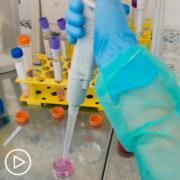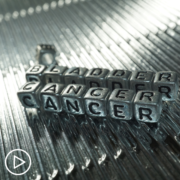Current Treatment Approaches for Bladder Cancer
Current Treatment Approaches for Bladder Cancer from Patient Empowerment Network on Vimeo.
Dr. Shilpa Gupta provides an overview of available bladder cancer treatment approaches and discusses the factors that impact therapy decisions.
Dr. Shilpa Gupta is the Director of the Genitourinary Medical Oncology at Taussig Cancer Institute and Co-Leader of the Genitourinary Oncology Program at Cleveland Clinic. Dr. Gupta’s research interests are novel drug development and understanding biomarkers of response and resistance to therapies in bladder cancer. Learn more about Dr. Gupta, here.
See More From The Pro-Active Bladder Cancer Patient Toolkit
Related Programs:

The Importance of Patient Self-Advocacy in Bladder Cancer Treatment |

|

|
Transcript:
Katherine:
You’ve touched upon treatment options but let’s walk through the treatment approaches for bladder cancer and who they might be right for, and I’d like to start with surgery. Who would be a good candidate for surgery?
Dr. Gupta:
I think patients who are otherwise fit, that is, they have good performance status, don’t have a lot of cardiac or other comorbidities, are not very obese, and of course have to be fit for any major procedure are usually considered good surgical candidates. But, as far as – In terms of staging, the patients with stage I, if BCG does not work in them or immunotherapy doesn’t work, they are recommended surgery if they are good candidates.
If they are not good candidates, we then – our role as medical oncologists is to offer other systemic therapies. As far as stage II cancer is concerned, the gold standard has been chemotherapy, followed by surgery but that’s the gold standard.
It may not apply for every patient. Depending on how fit patients are. Are they – we don’t usually just go by their chronological age but how fit they are? What are their comorbidities? If surgery is going to be a big burden for them moving forward, then we do talk about radiation and chemotherapy and other bladder preservation approaches.
Katherine:
What about immunotherapy and targeted therapies? Who would you use those on?
Dr. Gupta:
Well, since the advent of immunotherapies back in 2016 they’ve really – we’ve made a lot of progress and changed the way treat bladder cancer and the overall survival has improved by leaps and bounds with all these drugs.
Immunotherapy now plays a role in different stages. It is approved for superficial or non-muscle invasive bladder cancer if, let’s say, BCG doesn’t work. In muscle invasive disease we have along with others shown that immunotherapy is safe and effective, although it is not yet FDA approved, so there is a lot of clinical trials going on to prove its superiority in combination and by itself.
And, in metastatic disease or locally advanced disease immunotherapy plays a huge role for patients who have either disease recurrence after chemotherapy or are not good candidates for any chemotherapy.
I would say that immunotherapy is a very big – plays a very big role in the treatment. Unfortunately, not everybody responds to immunotherapy only about 20 to 25 percent of patients do.
That’s why we have these other novel therapies that have been coming through, like antibody drug conjugates, namely enfortumab vedotin, sacituzumab govitecan, and targeted therapy in the form of an FGFR inhibitor was the first targeted therapy that was approved a couple of years ago for patients who have a mutation in their tumors.
That’s really personalized medicine for those patients.
Katherine:
Right. What about biomarker testing? Does the presence of certain biomarkers impact certain treatment options?
Dr. Gupta:
That’s a great question and we’re all striving to find the perfect biomarker in bladder cancer. In the past we thought that expression of PD-L1 in the tumor cells and immune cells is a marker of how well the immunotherapy will work, but we have learned over the past couple of years that biomarker has turned out to be quite useless.
We don’t really need that to guide our treatment. We’re still depending on clinical biomarkers for immunotherapy use or chemotherapy use. I would say that the biomarker question is still being looked at and eventually I would say it’s not going to be one biomarker, but a composite of several different biomarkers that we will be able to use comprehensively.



